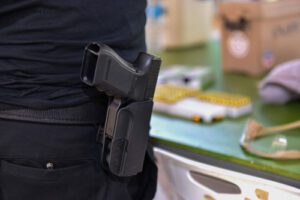 Judge Bumb concluded with the following: Lastly, at oral argument, this Court specifically pressed the State whether it had empirical evidence to suggest that concealed carry permit holders are responsible for gun crimes or an increase in gun crimes in New Jersey, which they cite as justification for the law. However, the State had no such evidence. [Tr. at 96.] Already having found that the Plaintiffs are likely to suffer irreparable injury and succeed on the merits of their Second Amendment claim, the Court now finds that the balance of equities and public interest also tip in Plaintiffs’ favor. Thus, all four requirements for injunctive relief have been satisfied.
Judge Bumb concluded with the following: Lastly, at oral argument, this Court specifically pressed the State whether it had empirical evidence to suggest that concealed carry permit holders are responsible for gun crimes or an increase in gun crimes in New Jersey, which they cite as justification for the law. However, the State had no such evidence. [Tr. at 96.] Already having found that the Plaintiffs are likely to suffer irreparable injury and succeed on the merits of their Second Amendment claim, the Court now finds that the balance of equities and public interest also tip in Plaintiffs’ favor. Thus, all four requirements for injunctive relief have been satisfied.
Further, Plaintiffs are excused from giving security because the Court is satisfied that there is no risk that a Defendant will sustain “costs and damages” if “found to have been wrongfully enjoined or restrained” pursuant to Fed. R. Civ. P. 65(c). The Court also finds that based on the showing made by Plaintiffs, good cause exists to extend the duration of this Temporary Restraining Order beyond fourteen (14) days pursuant to Fed. R. Civ. P. 65(b)(2). Thus, this Temporary Restraining Order will be in effect pending a hearing on Plaintiff’s motion for a preliminary injunction (which shall occur as expeditiously as possible once a briefing schedule for such motion has been set).
IV. CONCLUSION. Plaintiffs have demonstrated a probability of success on the merits of their Second Amendment challenge to the relevant provisions of Chapter 131 Section 7(a), which criminalizes carrying handguns in certain “sensitive places,” subparts 12 (public libraries or museums), 15 (bars, restaurants, and where alcohol is served), 17 (entertainment facilities), and 24 (private property), as well as section 7(b)’s ban on functional firearms in vehicles.
The State may regulate conduct squarely protected by the Second Amendment only if supported by a historical tradition of firearm regulation. Here, Plaintiffs have shown that Defendants will not be able to demonstrate a history of firearm regulation to support any of the challenged provisions. The deprivation of Plaintiffs’ Second Amendment rights, as the holders of valid permits from the State to conceal carry handguns, constitutes irreparable injury, and neither the State nor the public has an interest in enforcing unconstitutional laws. Accordingly, good cause exists, and the Court will grant the motion for temporary restraints.
As of May, 2022, it is unclear when Plaintiff’s motion for a preliminary injunction will be decided. The original briefing schedule called for the last brief to be filed on February 21, 2023. The major difference between a temporary restraining order and a preliminary injunction is that a temporary restraining order can be issued without notice to the adverse party.
